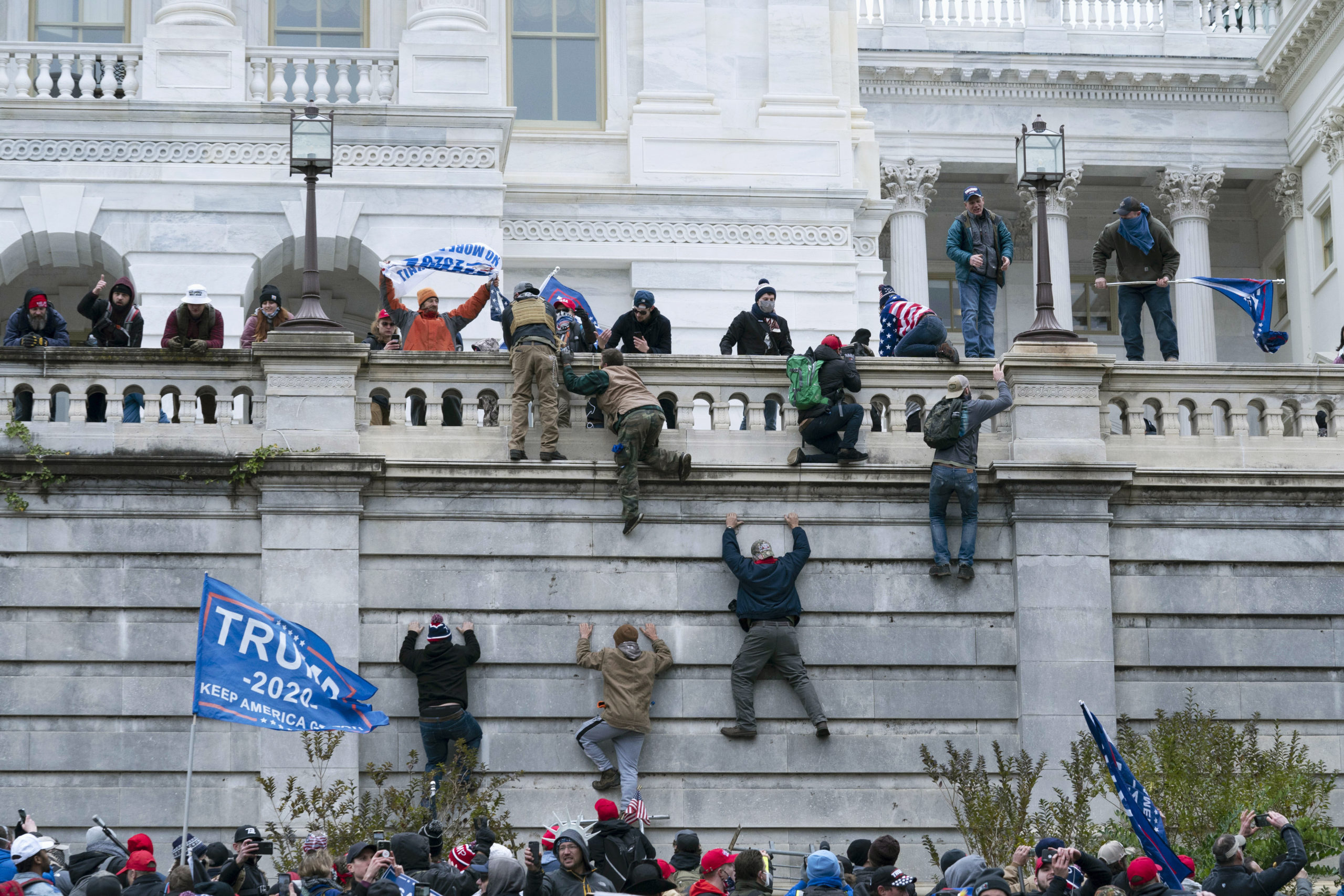
Violent insurrectionists loyal to President Donald Trump scale the west wall of the the U.S. Capitol in Washington on Jan. 6, 2021
I’ve been torn this month about what to focus on: the refusal of our industry to take true diversity goals seriously or the state of our democracy in the aftermath of the Jan. 6 insurrection. But I’ve come to realize those things are linked in ways few of us understand or are willing to acknowledge.
Thousands of Americans literally stormed the nation’s Capitol building, violently perpetrating an attack designed to undermine a democratic election. It was an attempt to overthrow an incoming-administration before it had a chance to serve. We saw it unfold on live national TV. We saw Americans scaling the sides of the building, breaking windows, beating police officers with poles and fists. We’ve learned there were men who brought arsenals of weapons and pipe bombs — and that coordination for some of that day’s actions reached all the way into the White House. We’ve since learned that top figures of the Republican Party had been stoking the flames of unrest that they were warned could turn violent, and their response has largely been to strategically put likeminded partisans in key elected offices throughout the country so the next attempt will be more successful.
Then-Vice President Mike Pence was reportedly afraid to be ushered away from the Capitol by the Secret Service. Maybe he would have been taken away under false pretenses so someone else could oversee and undermine the vote certification process in his absence. I can’t tell if that’s more or less disturbing than the gallows that were built as insurrectionists talked of hanging Pence on the lawn.
This happened in 21st century America. After a few days of consternation by Republicans, some public but even more in private, the GOP went back to stirring up culture war issues and downplaying the significance of that day. They knew Trump was a prime mover in the days and weeks leading up to what amounted to an attempted coup, but they were not concerned enough to do much about it other than sending frantic texts and phone calls while it was unfolding then covering their tracks afterwards.
This was after Trump had been impeached and the evidence that he had threatened to withhold taxpayer dollars to force the president of Ukraine to investigate the Bidens was clear and overwhelming. This was after Robert Mueller and his investigators detailed all the ways the Trump campaign had reached out to and wanted to work with Russia, one of our primary foreign adversaries. None of that convinced the Republican Party, its elected officials, or everyday Republicans to send a message to every future chief executive that such actions would not be tolerated in our democracy. And plenty of self-proclaimed moderates and independents have effectively blunted the truth of those ugly realities, speaking about them as though they amount to just another partisan fight between two equally imperfect major political parties.
I want to scream this from the rooftops, that the light is blinking red on our democracy, that if we were seeing this happen in any other nation on Earth, we’d see it clearly. Then I wanted to scream even more loudly after coming across a quote by the incoming editor of The New York Times.
“I honestly think that if we become a partisan organization exclusively focused on threats to democracy, and we give up our coverage of the issues, the social, political, and cultural divides that are animating participation in politics in America, we will lose the battle to be independent,” Joe Kahn told the Columbia Journalism Review in April.
No sane journalist is asking the paper of record to abandon all coverage except threats to our democracy. How is that not clear? What’s worse is the suggestion that focusing on threats to our democracy can in any reasonable way be construed as partisanship. It is clear the gravest threats to our democracy are coming primarily from one side of the political aisle. To state that plainly sounds like heresy to adherents of the school of objectivity and both-sides-ism. Those were Trump voters and supporters scaling the side of the Capitol building and smashing windows to stop the certification of the presidential election. Republicans have been trying to convince the public that Jan. 6 was no biggie. The Democratic Party has its flaws, profound ones. But they have not decided that holding fast to our democracy is less important than their hold on power the way the Republicans have.
All we’re asking is for journalists to tell the truth about what’s happening and to emphasize its importance. That’s all. If the truth seems partisan, that says something important about the imbalance of anti-democratic tendencies between the parties.
I have a strong feeling, though, that had our industry met any of the numerous diversity goals we set over the past few decades, it would be easier for us to grapple with what’s happening today because there would be fewer knee-jerk reactions to proposals asking for sensible changes that in the minds of too many in this industry seem like radical attempts to undermine journalism. The phony objectivity that has been an industry bedrock for far too long would have long been uprooted. It would have been easier to jettison journalistic traditions that may have worked in a different era but are bad for this one. It would have been harder to dismiss journalists clamoring for change as activists in disguise, harder to dismiss the echoes from darker periods of America that are being felt in a diversifying nation in the 21st century. That’s why I’m on board with those urging major organizations, including those who administer the Pulitzer Prizes, to make cooperation with efforts to measure the state of diversity within newsrooms throughout the country a requirement. Nothing else has worked. And we can’t afford to wait any longer.


